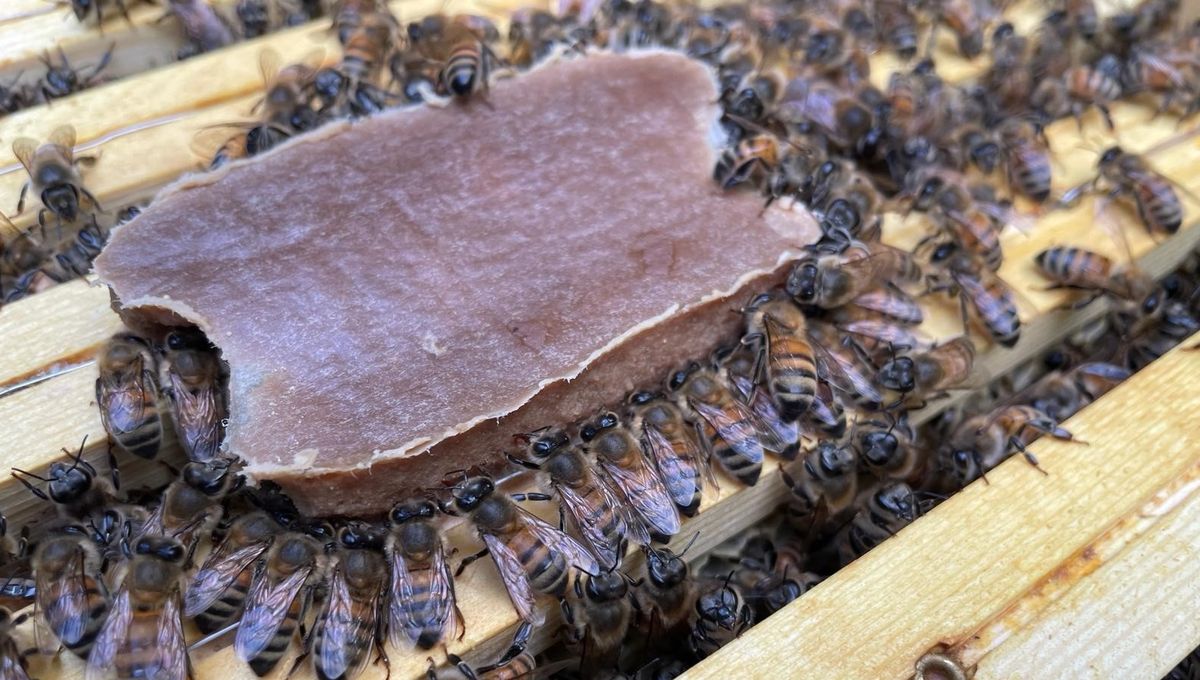
Scientists have developed a first-of-its-kind, fully synthetic food source that may revolutionize efforts to save honeybees. This new “Power Bar” can be put into bee colonies, helping to sustain them without the need for natural pollen.
This game-changing innovation is the outcome of a long collaboration between researchers at Washington State University and APIX Biosciences in Belgium. The new food source is akin to the human-made diets given to livestock and pets, and contains all the nutrients they need to thrive. It is hoped this food will help combat the collapse of bee colonies while also safeguarding global food supplies reliant on bee pollination.
Honey bees (Apis mellifera) play a vital role in global ecosystems and agricultural productivity. They are essential pollinators, joining other species that help sustain 75 percent of food crops across the world, as well as nearly 90 percent of wild flowering plants. However, these crucial critters are in danger.
Nectar and pollen provide the primary nutrition source for honey bees, but these natural food sources have become scarcer due to a variety of factors.
“Changes in land use, urban expansion, and extreme weather all negatively impact nutrition for honey bees and other pollinators,” Brandon Hopkins, P.F. Thurber Endowed Distinguished Professor of Pollinator Ecology at Washington State University, said in a statement.
“Honey bees are generalists and do not get all their nutrition from a single source. They need variety in their diet to survive but find it increasingly difficult to find the continuous supply of pollen they need to sustain the colony.”
In recent years, honeybee colonies have been collapsing at record rates, leading to mass deaths of these important insects. The implications are wide reaching. Not only has this die-off resulted in commercial beekeepers being pushed close to financial ruin, it also impacts the supply of food crops and the yield of honey. To be sure, the factors involved in this decline are not just hitting bees; across the world, insect populations are undergoing a mass decline.
This crisis underscores the need for urgent innovation, and the newly developed bee food source is just one step in this direction.
Resembling a human “Power Bar”, the food can be placed directly into a bee colony where it is processed by young bees and then distributed to larvae and adult bees. Over the course of ten years, scientists involved in the collaboration tested thousands of combinations of ingredients on bees to create this feed followed by large scale science-based field tests.
“Until this study, honey bees were the only livestock that could not be maintained on a man-made feed,” said Dr Patrick Pilkington, CEO of APIX Biosciences US.
“The reported scientific work shows in commercial field conditions that providing nutritionally stressed colonies with our pollen-replacing feed results in a major measurable step change in colony health compared to current best practices. Our product has the potential to change the way honey bees are managed.”
The most important discovery within this research was the role of isofucosterol, a molecule that naturally occurs in pollen and is an essential nutrient for honey bees. Colonies that consumed isofucosterol-enriched food survived an entire season without access to pollen, while those that did not have access to the food experienced severe declines. This included reduced larval production, adult paralysis, and overall colony collapse.
The field tests used to validate the new food source, which included a blend of the nutrients required for bees to survive, focused on nutritionally stressed colonies in blueberry and sunflower fields, both known for their poor pollen quality for bees. Compared to colonies that only received standard commercial feed or no supplementation, the bees fed on the new food source thrived, showing both increased survival and colony growth.
“Some beekeepers don’t pollinate blueberries anymore because colonies suffer or die and the pollination fees don’t cover the losses,” Hopkins said.
“Blueberry pollen isn’t very nutritious for honey bees, and they aren’t adapted well to pollinating that crop. But if they have this supplemental food source, beekeepers may return to pollinating those fields since they know their bees are more likely to survive.”
It is possible this new product will positively impact beekeepers and growers when it becomes available for purchase, but it only addresses one aspect of the greater threat facing insect species at the moment. As long as climate change continues, alongside more habitat loss and intensive agricultural practices, the future of bees and other pollinators remains under threat.
The study is published in the Proceedings of the Royal Society B Biological Sciences.
Source Link: First-Of-Its-Kind "Power Bar" For Bees Can Keep Colonies Alive Without Pollen